Mostly everyone, it seems, has an opinion about when and how South Florida should loosen restrictions that are keeping non-essential businesses from reopening.
President Trump said Tuesday, "We have to get our country open and we have to get it open soon," while conceding "some people will be affected badly."
Those most affected, of course, will die.
No group of people has seen the effects of the novel coronavirus as vividly -- and risen to deal with its impact as selflessly -- as nurses and doctors in hospitals.
So, as part of the NBC 6 Investigators' on-going survey of nearly 300 such health care professionals, we asked if Florida is ready to loosen social distancing rules, and found one third of those answering said they do think it's time to open up, at least to some degree.
Dr. Mark Matouka, an emergency room doctor at Memorial Hospital West, was adamant.
I think the shutdown is ridiculous. I think it’s damaging our economy.
Dr. Mark Matouka
“It’s not a worldwide catastrophe to destroy our economy over or for people to have their lives ruined over," Matouka said.
He said he understands why precautions were taken at first, as models suggested tens of thousands would be sickened in South Florida, stretching the limits of hospital capacities.
"We were prepared for catastrophe," he said.
But Dr. Matouka said that catastrophe never came.
"I’m amazed at how little true illness we are seeing from this virus," he said. "In most people, it’s just like the flu and I send them home."

But he cautioned, the frail elderly, immunocompromised, morbidly obese and others with underlying conditions that make them susceptible should remain distanced and take precautions.
"But for most young, healthy working people, I think everything should be opened back up," he said.
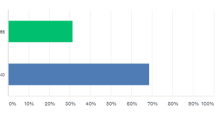
While his take is in the minority of our survey, he is not alone.
Another practitioner wrote: "The initial projections were all wrong. People need to start feeding their families, which is far more vital compared to the virus."
But two-thirds of the medical professionals surveyed disagreed.
"It's too early," one wrote. "In a pandemic, we need to be concerned about everybody, not just ourselves."
Afraid if we take a step back, more death will happen.
Survey Respondent
Nearly 70 percent of the survey participants said loosening social distancing rules should not be extended to South Florida. They cited the need for widespread testing and concerns about people not following social distancing rules.
“It’s a time bomb waiting to blow,” a respondent said about easing up restrictions in South Florida.
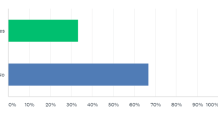
Dr. Jorge Infante, who has spent weeks in emergency rooms in south and central Florida, is concerned too much will be loosened up too soon.
“We have to continue to be vigilant. We have to continue to be careful,” Infante said.
Without knowing exactly how many people have been infected in the community, it’s very difficult to say we are safe.
Dr. Jorge Infante
While everyone agrees hospitals were not overrun with COVID-19 patients, ventilators did not run out and large numbers of otherwise healthy young people have not died, Infante said much of that success is precisely because of the government-mandated social distancing and other precautions.
"It was because we took it so serious that we only have hundreds of deaths in South Florida," he said, using the word "only" loosely." Is that adequate? I’m not sure. I think that’s worrisome."
He said reopening entirely too soon would invite a second, perhaps deadlier wave.
"Some people want to cure the economic hardships, but will it be making it worse if we have to put in place more restrictions in the future?" he asked.
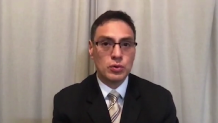
"I doubt it," Matouka responded when asked about a potential second wave. "I have not seen this virus to be as bad as they made it out to be...There’s tons of people that are asymptomatic or had minimal cold symptoms with it and the spread is out there."
Matouka said the shutdown is creating not just financial costs, but also emotional ones and unintended health costs.
He said he's seeing more patients showing up in the ER sicker than they should be because they've delayed going to a hospital, where they feared they would catch the virus.
Early on in our survey, it was the doctors and nurses themselves who feared catching the virus or bringing it home to their families. But over time, it seems things are looking up from the front lines.
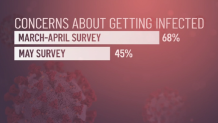
The share of respondents having “a lot” or “a great deal” of concern about getting infected has fallen, from 68 percent to 45 percent.
Some of the respondents though listed the number of colleagues who have contracted COVID-19 and at least six of those said they have lost a colleague to the virus.
The most surprising thing is how fast it can affect you personally, someone you love, and how suddenly you can lose somebody and not even be present to say goodbye.
Survey Respondent
The NBC 6 Investigators’ survey finds there is less concern about the ability of the healthcare system to handle the crisis.
During March and April, only 33 percent said their workplace had enough resources to handle a surge in patients versus 63 percent who do now.
When first asked if their workplaces had adequate personal protective equipment, 60 percent of respondents said they were adequately protected. Now, 75 percent say they have adequate PPE, as it's known.
Patricia Diaz, a registered nurse at HCA’s University Hospital and Medical Center, said getting access to proper protective equipment is still an issue for her and her colleagues.
“It’s a little chilling because we’re still not getting what we’re asking for,” Diaz said.
Diaz, a member of the local 1199 Service Employees International Union (SEIU), is concerned about recent guidelines implemented by HCA's hospitals in our area limiting the use of N95 masks, even when treating COVID-19 positive patients.
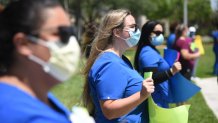
Medical workers across HCA’s hospitals in South Florida have protested the policy.
“They’ve heard our cry, you know, that we don’t feel safe. And I want to say they’re not pushing harder, but they're not, they're not responding,” Diaz said. “We’re still not getting the proper PPE.”
HCA said it had to change its policy to prepare for any surge, “amidst a global shortage” of protective equipment.
Our survey reveals it’s not the only hospital system to do so.
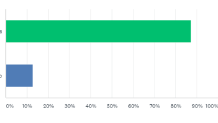
Nearly 90 percent of participants responded that their workplaces have implemented measures to conserve PPE, including restricting access to N95 masks or sterilizing masks for reuse. About 42 percent of them said those measures imperiled their safety and their colleagues.
Diaz said the state should not reopen until all medical professionals have access to the protective gear they need.
“It scares me,” Diaz said when asked about reopening South Florida. “I understand people want to get their bills paid, people want to get back to work…but if we don’t do this properly, everything we have gone through would be in vain.”

